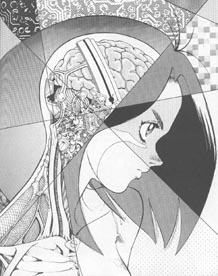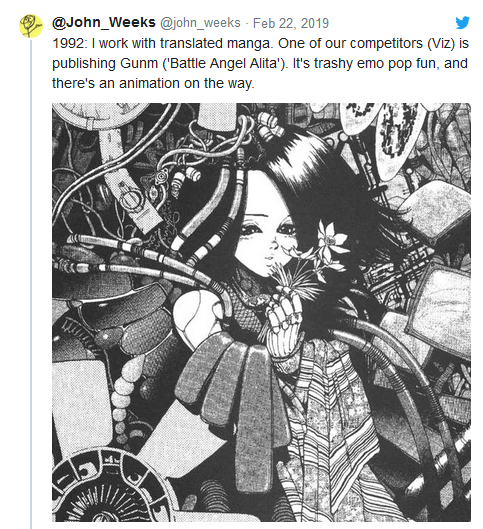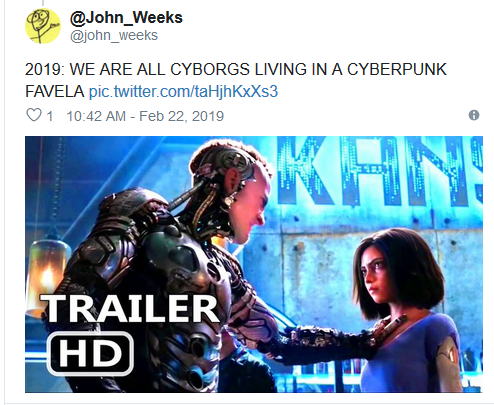In the early 90s, I was working on editing the translated Caravan Kidd by Johji Manabe, which involved an cute robot (with amnesia) and her pals fighting bad guys in a bio-mechanical landscape.
Our manga competition at the time was Viz comics, and one of their star properties was Alita (originally Gunm), about a cute cyborg (with amnesia) and her pals fighting bad guys in a bio-mechanical landscape. Certainly neither was a titan of literature, but they fit the cyber-punky tone of the times.

Alita eventually had a short anime made of it, and now a film by Robert Rodriguez. Rodriguez is good value; if he adapted the phone book I’d check it out. So I bought a ticket, decades later, in Phnom Penh.Rather than a full-blown review, a few thoughts in no particular order:
- * Was a live-action film really necessary? An animated version has all the special effects budget you’ll ever need.
And more room for the characters to develop.
- * For a junkyard favela, it’s sure pretty luxurious. There’s not a single beggar, or prostitute. It’s what Bruce Sterling calls ‘favela chic’. Blade Runner: ‘look what we could become.’ Alita: ‘Iron City is cool dystopian fun’.
- * TvTropes calls this sort of drama ‘break the cutie‘ and it’s a good fit; I think kids will identify with it pretty easily. The title character kills and kills but her hair remains perfect.
- * Filmed in Texas, it stars Rosa Salazar and Rodriguez throws in a bit of Latinx subtext if you look for it.
- * Apparently the manga comic is still going. The creator tried to finish it, but revised what he thought was the conclusion and kept at it. He likes drawing cute cyborgs fighting and it’s taken him some interesting places.
- * Alita’s changing body could easily be given a queer/trans reading, (particularly with regards to body dysmorphia) and I look forward to seeing takes on that.
- * Family comes not from biology but choice, and Christoph Waltz does a nice understated portrayal of ‘action dad’ adoptive father Ido.
- * If you’ve only known a boy for three days? Maybe don’t sell your body parts for him. One of the charming things about the manga/anime is that Alita is infatuated with Hugo, who’s pretty clearly a bad choice. The story doesn’t judge her for it, which is nice to see.
- * The audience watching it in subtitled Khmer enjoyed it (loved the ‘motorball’ arena scenes) and found the story quite relatable.
As with Ender’s Game, there’s a teenage character goaded to violence. The argument for this usually is ‘you made me do it’ or, ‘it was self-defense’. But even in a split-second, the decision to do harm is a fundamental moral choice.
I know child soldiers, gang members. They are profoundly messed up human beings from the hurting and killing they’ve done. The price for violence against others is ultimately (at some level) violence against yourself- psychologically and often manifested physically. That’s why – for example – the suicide rate for American soldiers is higher than their death rate in combat.
The film’s characters shrug this off just a little too easily, similar to kung fu films. (I imagine there would be no film if they spent decades going though PTSD therapy.)
Rodriguez filmed Dawn To Dusk, Machete, Grindhouse; he’s no shrinking violet. He codes the mayhem between robots/cyborgs as more abstracted and cartoony, and the deaths of full humans as deeply tragic. But we should have empathy for all sentient beings. To Rodriguez’s credit, it encourages us to extend our empathy across the uncanny valley to the title character herself, as she (and the film) earnestly offer its artificial heart.
Tags: adaptation, cinema, manga, Robert Rodriguez



